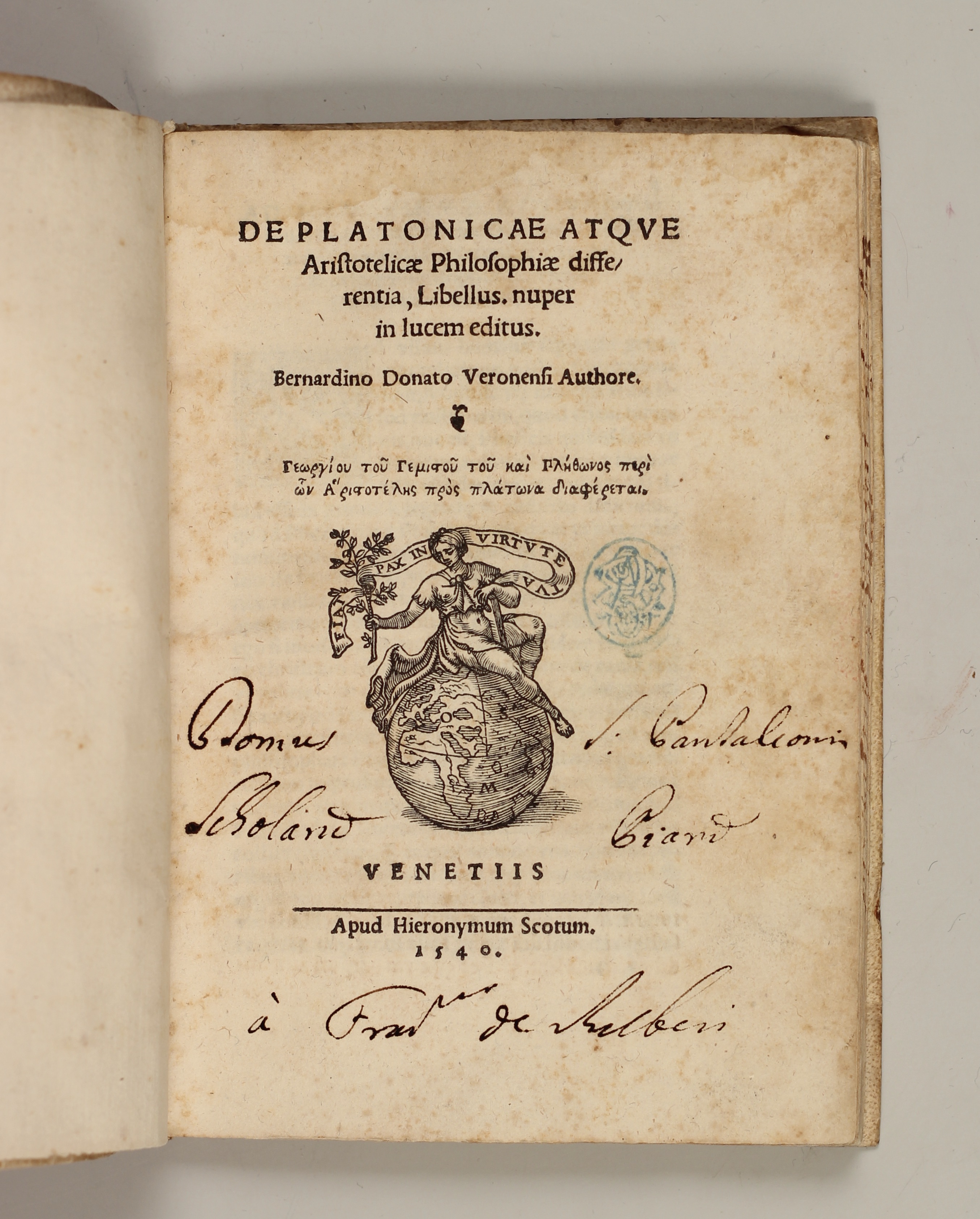Donatus, Bernardinus / Gemistos Plethon
De Platonicae atque Aristotelicae philosophiae differentia … — Venice 1540
De Platonicae atque Aristotelicae philosophiae differentia, Libellus. nuper in lucem editus.
Γεωργίου τοῦ Γεμιστοῦ Πλήθωνος περὶ ὧν Ἀριστοτέλης πρὸς πλάτωνα διαφέρεται.
Venice, Hieronymus Scotus, 1540.
First edition of Donato and Pletho
8vo (155 x 107 mm). a-d8 e4 a-g8: 71 pp.; 23 leaves, (1) leaf (with device). A little faint round stamp and ownership entries on title; a bit foxed – first page heavier then the rest – and faint watermargin towards the end.
Contempoary vellum. Title and scribblings on upper cover, spine worn. Fore-edge with ms. title. – Legrand III, 388 („Livre de toute rareté.“); Adams D 797 and P 1531. Θ. Ι. Παπαδοπουλος, Ἑλληνικα Βιβλιογραφια, no. 2417.
¶ Georgius Gemistus Pletho, ca. 1355-1452, „Greek Platonic philosopher and scholar, one of the chief pioneers of the revival of learning in Western Europe, was a Byzantine by birth who settled at Mistra in the Peloponnese, the site of ancient Sparta. He changed his name from Gemistus to the equivalent Pletho (,the full‘), perhaps owing to the similarity of sound between that name and that of his master Plato. He invented a religious system founded on the speculative mysticism of the Neoplatonists, and founded a sect the members of which believed that the new creed would supersede all existings forms of belief. But he is chiefly memorable for having introduced Plato to the Western world. This took place upon his visit to Florence in 1439, as one of the deputies from Constantinople on occasion of the general council. Cardinal Bessarion became his disciple; he produced a great impression upon Cosimo de’ Medici … he effectually shook the exclusive domination which Aristotle had exercised over European thought for eight centuries …“ (Enc. Brit. 11th ed., vol. 11, 573).
The differences betwen Plato and Aristotle is a summarize of the lectures held by Pletho in Florence in the house of Cardinal Cesarini at the Council of Florence 1438 – 1439. It marks the beginning of the Plato-Aristotle controversy of the 15th and 16th century – the most prominent works are George of Trebizond’ Comparatio Platonis et Aristotelis of the Aristotelian and Bessarion’s In calumniatorem Platonis of the Platonist group. On this dispute and the part Pletho played in it see J. Hankins, Plato in the Renaissance, vol. II, 193ff.: „Pletho is the chief actor in the earlier stages of the Plato-Aristotle controversy. Moreover, his interpretation of Plato and the Platonic tradition was perhaps the most important influence shaping the view of Platonism held by Bessarion and Ficino and (therefore) by the Latin West as a whole.“ (197).
It is Pletho from whom Cosimo de’ Medici acquired or had copied a Greek manuscript of the complete Corpus Platonicum. This manuscript was the source for Ficino’s most important translation into Latin, published in 1484.
P. R. Blum characterizes Pletho as the éminence grise of Renaissance Platonism. (Tumult, 2005, p. 119).
Donato (ca. 1470-1532)
Il celebre letterato from Verona, held the chair of Greek in Padua from 1526 onwards, lectured in Verona on Latin and Greek, edited a number of books in Venice, then in Verona, engaged as direttore editoriale by Gian Matteo Giberti, Bishop of Verona, to publish a series of Greek fathers – i. a. the four volumes Chrysostomos in Greek, one of the most beautiful books printed in that language.
Donato’s De differentiis … is a dialogue between the Aristotelian Pollicarpus (i. e. the very fruitful, productive) and the Platonist Callistus (i. e. the most beautiful and respectable), and is part of a genre inaugurated by Pletho and ending in the 16th century with the corresponding books of Sebastian Fox Morcillo (1554), Jac. Carpentarius (1573), Buratellus (1573), and Jacopo Mazzoni (1597).





